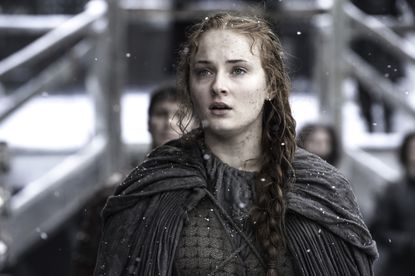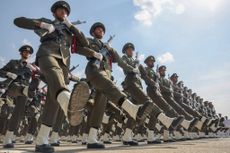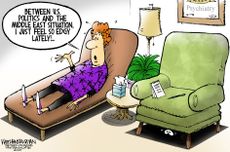Game of Thrones has a Sansa problem
Is Sansa Stark dim and virtuous or evil and cunning? She can't be all those things.


Given the overwhelming praise for the truly brilliant direction, cinematography, and acting in Game of Thrones' latest episode (the painterly and cathartic "Battle of the Bastards"), allow me to register a small countervailing complaint against the writing. In brief: WTF, SANSA?
Why didn't Sansa tell Jon she had another army via Littlefinger? We don't know. And the trouble is that it's not clear whether Game of Thrones does either.
The show has depended more and more on viewers to inexpertly paper over many of its massive missing facts and motivations. Why, to take a recent example, would Arya cower in a cave at the end of one episode (implying that she understands perfectly that the Faceless Men are after her) only to saunter around Braavos unarmed in the next? Is it logical for an intelligent character — who has spent two seasons training under a magical assassin cult that blinded her for merely disobeying them — to flaunt her money and gawp at the view after going AWOL during a mission?
Subscribe to The Week
Escape your echo chamber. Get the facts behind the news, plus analysis from multiple perspectives.

Sign up for The Week's Free Newsletters
From our morning news briefing to a weekly Good News Newsletter, get the best of The Week delivered directly to your inbox.
From our morning news briefing to a weekly Good News Newsletter, get the best of The Week delivered directly to your inbox.
It is not logical. It is ludicrous. And so, theories bloomed.
It reminds me of clotting, this ritual: Fans crowd to the gaping hole in the plot wound and stanch it with possible solutions. Sadly, there was no solution to find. Game of Thrones wrote Arya as just that dumb: She behaved stupidly, got stabbed for it, took a poppy-nap, got her host killed, did some nifty parkouring after discovering she was invincible, sliced a candle. Jaqen announced Arya was "no one" for reasons no one understood, and that was the end.
Arya's arc didn't just get derailed, it got drunk. Someone at HBO wanted a cool chase sequence so badly they mistook speed for catharsis and trampled the whole Braavos plot.
And here we are again, faced with another Stark daughter trapped in an episode so pumped about its (truly) amazing action sequences that it might be requiring weird things of its characters. Sansa's behavior leading up to this episode is incredibly damaging and oddly unexplained. Why keep Jon in the dark? Is this advancing her arc, or is it, like Arya's, contorting a character to suit the battle's needs? (Everyone loves a last-minute cavalry charge, after all.)
The show's opacity on this point muddies its stakes. We don't understand what Sansa knows and what she doesn't, which makes it hard to understand how responsible Sansa was for the horrific carnage and the eventual victory. Is she the architect of her revenge (and Jon's near-death) or a lucky beneficiary of Littlefinger's good timing? These are crucial questions, and the answers matter because one of these possibilities makes her the villain. It's as if we've been saddled with Schrodinger's Sansa: she's either Dim and Virtuous or Evil and Cunning. Right now — to everyone's confusion — she's both.
The case for Dim Sansa
The Dim Sansa case is simple: Sansa writes to Littlefinger but doesn't tell Jon Snow. Why? Maybe she didn't hear back. Maybe she's not sure he'll turn up. Maybe she just likes knowing she has a secret.
Dim Sansa is sometimes petulant and changes course often. She hectors Ser Davos for not understanding the North, annoys the houses she asks for help, and resents Jon for not asking for her advice but then decides not to tell him anything when he does. Still, she's basically good.
In the Dim Sansa timeline, it's pure luck that Littlefinger showed up when he did. Sansa gets to keep her virtue and recovers her good judgment long enough to dispatch Ramsey to everyone's satisfaction.
Yes, this is an irritating and pointlessly changeable version of a character whose growth we've been awaiting and whose catharsis was earned. Unfortunately, the previews for Episode 10 support Dim Sansa. Despite years of abuse and experience, she seems surprised that Littlefinger wants her hand in exchange for his help. (The good news? Given Jon's noble but catastrophic stupidity during the Battle of the Bastards, she remains the cleverer Stark.)
The case for Cunning Sansa
This one's more fun. Let's say Sansa knew Littlefinger was coming and planned his arrival without telling Jon. Cunning Sansa has her reasons: If the Vale army showed up in advance, Ramsey would likely retreat to Winterfell, where he couldn't be defeated. He had to be goaded out into a war he thought was winnable; he had to be baited with the promise of a slaughter. This would make Sansa a brilliant and Machiavellian military strategist. It would also make Jon the bait.
Evidence in favor: She arrives riding next to Littlefinger, implying significant coordination between them.
Evidence against: She says she knows nothing about battles. (But this might be guile. We have seen Sansa lie creatively and well before.)
Her arrival on the battlefield is not, in the Cunning Sansa timeline, a Proud Feminist moment. It indicates, rather, that Sansa is willing to sacrifice most of an army and both her surviving brothers in order to achieve her aims. Jon could have died 100 times before Littlefinger arrived, and Sansa would have been crazy to expect any other outcome. No, if this was a plan, then for Sansa, the death of two of her brothers was the price she was willing to pay. If this is what's happening, then this isn't even the beginning of Sansa's descent into villainy; she's been headed this way for some time and we missed it.
It's worth noting, as evidence, that Sansa instigated this battle. "Where will we go?" Jon asks her in this season's fourth episode, "Book of the Stranger." "There's only place we can go. Home," she says. Jon is (as ever) resistant. "If we don't take back the North, we'll never be safe. I want you to help me. But I'll do it myself if I have to," Sansa says. And finally: "A monster has taken our home and our brother. We have to go back to Winterfell and save them both." Having gotten Jon to commit to fighting, she calmly explains to a baffled Jon this week that the "saving Rickon" part of her spiel is naive: He's as good as dead.
Cunning Sansa knows Brienne will object to her methods, so she sends her on a trumped-up quest. Remember when Brienne asks Sansa why she needs to go to Riverrun in person? "We can send the Blackfish a raven," Brienne offers. "We can't risk Ramsey intercepting it. It has to be you," says Sansa, who proceeds to send Littlefinger a raven. Cunning Sansa wants Brienne out of the way because Brienne might object to Sansa setting her brother and his army up to be slaughtered. (Cunning Sansa — if she exists — would actually explain much of the narrative nonsense that surrounded Riverrun. Without her, the Blackfish was just a red herring.)
In the Cunning Sansa timeline, Sansa is no longer a Stark in name or in spirit. She is not loyal. She is wounded, degraded, a starving dog, like the Northerners who turned on her.
And her disillusionment and cynicism morphs into something worse: "You said you would protect me," she spits at Littlefinger in "The Door." "You can't protect me. You wouldn't even be able to protect yourself if I told Brienne to cut you down." She says something similar to Jon before the battle: "You can't protect me. No one can protect anyone." This sounds like an echo; it's actually a deadly turn in a speech from a woman prepared to sacrifice the only family she has left to her goal.
The other evidence for Cunning Sansa is, of course, how comfortably she steps into Ramsey's shoes. Sansa watches the battle from a safe distance, just as Ramsey does. She watches human beings getting slaughtered with a sickly, blue-eyed, pallid smirk that looks awfully familiar:
[[{"type":"media","view_mode":"media_large","fid":"157367","attributes":{"alt":"","class":"media-image","height":"337","typeof":"foaf:Image","width":"600"}}]](Screenshot/HBO/Game of Thrones)
[[{"type":"media","view_mode":"media_large","fid":"157366","attributes":{"alt":"","class":"media-image","height":"339","typeof":"foaf:Image","width":"600"}}]](Screenshot/HBO/Game of Thrones)
And while Ramsey's final words, "You can't kill me, I'm a part of you now," reinforce rumors that Sansa is pregnant, he does seem to have unsouled her. Rather than kill straightforwardly, like a Stark, Sansa chooses Ramsey's methods.
This would be fascinating and tragic and rich — a pregnant Lady Sansa Stoneheart ready to wreak havoc on her enemies no matter what the cost. Cunning Sansa would have understood the bargain when she sent for Littlefinger. Cunning Sansa is cold, the Northern Ice to Dany's Fire. Like Dany, she's capable of fratricide. Like Dany, who inexplicably lets the Sons of the Harpy kill hundreds before intervening with her dragons, Sansa is more than willing to let people die.
It's not a bad case, right?
Here's the thing: These are not compatible scenarios. Either Sansa planned Littlefinger's late arrival — in which case she's responsible for the carnage and for recovering Winterfell, or she didn't and gets no credit for the victory. She just got lucky. I worry — I really do — that Game of Thrones, by eliding the horrific compromises she'd have had to make offscreen to make this work, is awkwardly trying to make her virtuous and a great planner, a feminist powerhouse who might still be a force for good. The Battle of the Bastards made that structurally impossible. I hope they see that. I hope they don't try to make her both.
Create an account with the same email registered to your subscription to unlock access.
Sign up for Today's Best Articles in your inbox
A free daily email with the biggest news stories of the day – and the best features from TheWeek.com
Lili Loofbourow is the culture critic at TheWeek.com. She's also a special correspondent for the Los Angeles Review of Books and an editor for Beyond Criticism, a Bloomsbury Academic series dedicated to formally experimental criticism. Her writing has appeared in a variety of venues including The Guardian, Salon, The New York Times Magazine, The New Republic, and Slate.
-
 'A direct, protracted war with Israel is not something Iran is equipped to fight'
'A direct, protracted war with Israel is not something Iran is equipped to fight'Instant Opinion Opinion, comment and editorials of the day
By Harold Maass, The Week US Published
-
 Today's political cartoons - April 17, 2024
Today's political cartoons - April 17, 2024Cartoons Wednesday's cartoons - political anxiety, jury sorting hat, and more
By The Week US Published
-
 Arid Gulf states hit with year's worth of rain
Arid Gulf states hit with year's worth of rainSpeed Read The historic flooding in Dubai is tied to climate change
By Peter Weber, The Week US Published